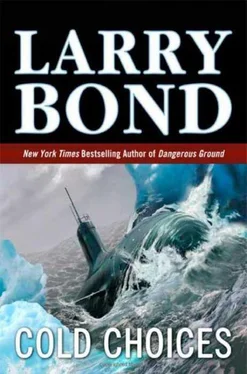Petrov nodded as he scribbled down the facts in his notepad. “Now for the crucial question, Igor. How long before the air will no longer sustain life?”
“I believe we have several days before carbon dioxide becomes a critical concern. We have plenty of oxygen in the storage tanks, but without the air-purification system, we have limited means of removing the carbon dioxide. I will have a better estimate once I know how many air-regeneration cassettes we recovered and how many. how many of the crew are still alive.” Fonarin’s last sentence trailed off suddenly. Embarrassed at the implication that the deaths they’d suffered thus far were of benefit to the rest.
“Thank you, Igor. Gather your data and make your calculations quickly.”
“Captain,” interrupted Dr. Balanov. “Forgive my ignorance, but why are we even discussing this? Shouldn’t we move the surviving crew members into the rescue chamber and abandon ship?”
An eerie silence filled the central post, as most of the senior officers looked down or away from the doctor and declined to speak. Sensing that he was missing an important point, he asked, “Why are you looking that way? What is it I do not understand?”
It was Kalinin who finally took pity on poor Balanov. “The reason why we haven’t used the VSK, Doctor, is that our port list is too great. The locking mechanism that secures the chamber to the boat is friction-bound. There is no way for us to detach.”
“I see,” said Balanov nervously. “Thank you for the explanation, Starpom.”
“Your report, Doctor,” ordered Petrov.
“We have suffered at least six dead and we have over a dozen moderate to serious injuries. At least eight men are missing and are presumed dead. We are compiling a comprehensive list of the deceased, missing, and injured and you will have it within thirty minutes. We also have one psychological casualty.”
“Psychological casualty?” inquired Petrov curiously. “Explain.”
“I was forced to sedate Captain-Lieutenant Sadilenko. He suffered a total loss of control and he was becoming a danger to his men.”
Both Petrov and Kalinin were now even more confused. Yakov Sadilenko was a most promising young officer with nerves of steel. His performance during the certification trials had been exemplary and he clearly knew his duties. What could have caused him to crack?
Kolesnikov, the chief of damage control, spoke up. “As the commander of compartment five, Sadilenko personally initiated the delivery of the LOKh into compartment six when it appeared that the fire would fully engulf the space. We didn’t know if everyone in compartment six had escaped. We couldn’t see because of the thick smoke and we couldn’t communicate with compartment seven.” There was a pause in the narration as Kolesnikov fought to keep his emotions in check. He too was clearly affected.
“There were tears streaming down his face, sir, as I watched him turn the wheel and flood compartment six with Freon gas. After the fire was out, we went into the compartment and found two bodies. Both men had been suffocated by the gas. One of them was Captain Third Rank Aryapov, the commander of compartment six.”
Kalinin closed his eyes and turned away, hiding the pain he felt. Petrov felt another blow. Aryapov and Sadilenko were exceptionally close. The joke was that they were twin sons born of different mothers. They worked together, played together, and drank together.
“He fulfilled his duty, comrade Captain,” continued Kolesnikov. “But I fear it will cost him his sanity. As soon as he saw Aryapov’s contorted face, Yakov knew he had killed him and his mind snapped. It took four of us to pin him down while the doctor administered the sedative.”
An uncomfortable, haunting quiet fell upon the participants of the meeting. The grief and stress they all felt was palpable.
“Comrades,” spoke Petrov softly, breaking the uneasy silence. “I know we all want to grieve the loss of our friends and shipmates. But unless we are willing to grieve much more, I need you to be focused on securing our survival. We have to fulfill our duty to the living first, then to the dead.”
The shallow nodding of heads by all present told Petrov that his gentle admonishment had gotten through. “All right, then. Doctor, what are our biggest challenges, in priority order?”
“We have three major issues to deal with, comrade Captain.” Dr. Balanov counted on his fingers as he ran down the list. “Number one. Captain Fonarin is absolutely correct, hypercapnia, carbon dioxide poisoning, is our greatest obstacle. A human being can function with oxygen as low as fourteen percent, and live down to about twelve percent with reduced mental capacities. But if carbon dioxide concentration gets above two percent, there are immediate and significant negative effects. Most prevalent are severe headaches, fatigue, and an increase in the rate of breathing. At five percent, an individual experiences hyperventilation, convulsions, and unconsciousness. Above six percent, death occurs.
“Second is atmospheric pressure. The more gas we release into the compartments, the higher the pressure. If the pressure gets sufficiently high to drive enough atmospheric gasses into our bloodstream, the crew could experience decompression sickness during the rescue operation.” Decompression sickness, or the bends, results when an individual breathing compressed air is suddenly moved to an environment with a lower pressure. The gases in the blood form small bubbles that can cause significant pain, and even death if not treated promptly.
“In addition, higher atmospheric pressure will increase the effects of carbon dioxide poisoning. So this must be monitored carefully. Finally, the third issue is hypothermia. Without power for the heating system, the temperature inside the submarine will be down to about two or three degrees Centigrade in a few hours. Every possible effort needs to be taken to try and keep the crew as warm as possible. Excessive cold for long periods, while bad in and of itself, will also exacerbate the carbon dioxide problem.”
“Understood, Doctor,” Petrov responded, feeling a little more like his old self. Instead of merely reacting to circumstances, he was working with his men to come up with a plan of action to deal with a significant problem. “Starpom, make up a duty roster and limit the number of watchstanders to three: a deck officer, an engineer to keep watch on the reserve battery, and a sonar technician to monitor the underwater communications system.”
“Aye, Captain,” replied Kalinin. “Do you want a chemical service watch-stander to monitor the atmosphere?”
“Fonarin will conduct an air sample once every four hours and report the results to the deck officer and Dr. Balanov. Beyond that, I don’t think we need a dedicated watchstander. Everyone else not on watch is to lie down, no unnecessary physical activity. This should reduce the amount of carbon dioxide we produce.”
“Captain,” said Kolesnikov, “I recommend that we get as many men into survival suits as we can. They were designed for immersion in water and so they should work just as well, if not better, in air. This will help to reduce the chance of hypothermia.”
“Good suggestion, Yury. Please, see to the distribution of the suits. Anything else? Anyone?” No one offered a response to the captain’s questions.
As the officers collected their notes, Petrov spoke again. “One last item. Tell your men that the situation is not hopeless. We are not just waiting to die. The V-600 emergency distress information buoy was automatically deployed when we hit the ocean floor.
“Northern Fleet Headquarters is aware of our plight and will send all available resources to find us and rescue us. We are taking these measures to give the fleet time to get here, ascertain the situation, and effect a rescue. Emphasize that we need their help if we are to succeed.
Читать дальше












